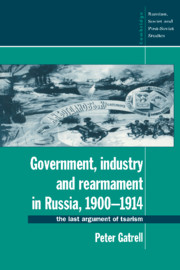Book contents
- Frontmatter
- Contents
- List of maps
- List of tables
- Preface
- Acknowledgements
- List of abbreviations
- 1 European Russia in 1914 showing the location of major enterprises
- 2 Urals state ironworks in 1914
- 3 St Petersburg in 1914 showing the location of major shipyards and armaments factories
- Introduction
- Part I Defence imperatives and Russian industry, 1911–1907
- 1 Defence and the economy on the eve of the Russo-Japanese War
- 2 War and revolution, retrenchment and recession
- Part II Rearmament and industrial ambition
- Conclusion
- Notes
- Bibliography
- Index
- Cambridge Russian, Soviet and Post-Soviet Studies
2 - War and revolution, retrenchment and recession
Published online by Cambridge University Press: 07 May 2010
- Frontmatter
- Contents
- List of maps
- List of tables
- Preface
- Acknowledgements
- List of abbreviations
- 1 European Russia in 1914 showing the location of major enterprises
- 2 Urals state ironworks in 1914
- 3 St Petersburg in 1914 showing the location of major shipyards and armaments factories
- Introduction
- Part I Defence imperatives and Russian industry, 1911–1907
- 1 Defence and the economy on the eve of the Russo-Japanese War
- 2 War and revolution, retrenchment and recession
- Part II Rearmament and industrial ambition
- Conclusion
- Notes
- Bibliography
- Index
- Cambridge Russian, Soviet and Post-Soviet Studies
Summary
Introduction: the emergence of a new agenda, 1904–1907
Sergei Witte, the deposed Minister of Finances, argued that the war against Japan proved a turning point in the fortunes of imperial Russia. The war, he said, ‘even if it did not create the revolution, brought revolution forward by decades’. The events in the Far East unleashed a torrent of criticism of the old regime by liberal members of the Russian intelligentsia, the nobility and the merchant estate. These disparate social groups urged the Tsar to concede some form of national assembly that would oblige him to listen to the voice of ‘society’ (obshchestvennos'). Some liberal activists demanded a parliament, elected on the basis of universal, equal, direct and secret suffrage. They were not alone. As news reached St Petersburg in December 1904 of the fall of Port Arthur, workers in the capital took to the streets in protest against living conditions and behind the banner of radical reform. The following year and a half of revolutionary action by workers, peasants, soldiers and sailors affected all realms of political and economic life. In October 1905, the Tsar was obliged to issue a manifesto, conceding a form of parliamentary government. Countrywide elections led to the convocation of the First Duma in May 1906.
The loss of human life in the war against Japan was accompanied by the destruction of capital, notably the loss of military vessels, amounting to three-fifths of the value of the imperial fleet.
- Type
- Chapter
- Information
- Government, Industry and Rearmament in Russia, 1900–1914The Last Argument of Tsarism, pp. 65 - 114Publisher: Cambridge University PressPrint publication year: 1994



